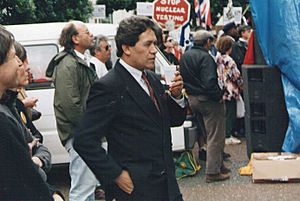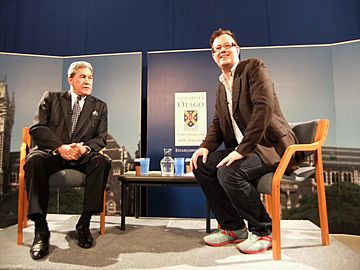Winston Peters facts for kids
Quick facts for kids
Winston Peters
MP
|
|||||||||||||||||||||||||||||||||||||||||||||||||||
|---|---|---|---|---|---|---|---|---|---|---|---|---|---|---|---|---|---|---|---|---|---|---|---|---|---|---|---|---|---|---|---|---|---|---|---|---|---|---|---|---|---|---|---|---|---|---|---|---|---|---|---|
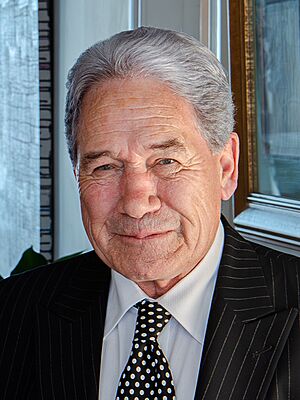
Peters in 2024
|
|||||||||||||||||||||||||||||||||||||||||||||||||||
| 13th Deputy Prime Minister of New Zealand | |||||||||||||||||||||||||||||||||||||||||||||||||||
| In office 27 November 2023 – 31 May 2025 |
|||||||||||||||||||||||||||||||||||||||||||||||||||
| Prime Minister | Christopher Luxon | ||||||||||||||||||||||||||||||||||||||||||||||||||
| Governor-General | Cindy Kiro | ||||||||||||||||||||||||||||||||||||||||||||||||||
| Preceded by | Carmel Sepuloni | ||||||||||||||||||||||||||||||||||||||||||||||||||
| Succeeded by | David Seymour | ||||||||||||||||||||||||||||||||||||||||||||||||||
| In office 26 October 2017 – 6 November 2020 |
|||||||||||||||||||||||||||||||||||||||||||||||||||
| Prime Minister | Jacinda Ardern | ||||||||||||||||||||||||||||||||||||||||||||||||||
| Governor-General | Patsy Reddy | ||||||||||||||||||||||||||||||||||||||||||||||||||
| Preceded by | Paula Bennett | ||||||||||||||||||||||||||||||||||||||||||||||||||
| Succeeded by | Grant Robertson | ||||||||||||||||||||||||||||||||||||||||||||||||||
| In office 16 December 1996 – 14 August 1998 |
|||||||||||||||||||||||||||||||||||||||||||||||||||
| Prime Minister | Jim Bolger Jenny Shipley |
||||||||||||||||||||||||||||||||||||||||||||||||||
| Governor-General | Michael Hardie Boys | ||||||||||||||||||||||||||||||||||||||||||||||||||
| Preceded by | Don McKinnon | ||||||||||||||||||||||||||||||||||||||||||||||||||
| Succeeded by | Wyatt Creech | ||||||||||||||||||||||||||||||||||||||||||||||||||
| 25th Minister of Foreign Affairs | |||||||||||||||||||||||||||||||||||||||||||||||||||
| Assumed office 27 November 2023 |
|||||||||||||||||||||||||||||||||||||||||||||||||||
| Prime Minister | Christopher Luxon | ||||||||||||||||||||||||||||||||||||||||||||||||||
| Preceded by | Grant Robertson | ||||||||||||||||||||||||||||||||||||||||||||||||||
| In office 26 October 2017 – 6 November 2020 |
|||||||||||||||||||||||||||||||||||||||||||||||||||
| Prime Minister | Jacinda Ardern | ||||||||||||||||||||||||||||||||||||||||||||||||||
| Preceded by | Gerry Brownlee | ||||||||||||||||||||||||||||||||||||||||||||||||||
| Succeeded by | Nanaia Mahuta | ||||||||||||||||||||||||||||||||||||||||||||||||||
| In office 19 October 2005 – 29 August 2008 |
|||||||||||||||||||||||||||||||||||||||||||||||||||
| Prime Minister | Helen Clark | ||||||||||||||||||||||||||||||||||||||||||||||||||
| Preceded by | Phil Goff | ||||||||||||||||||||||||||||||||||||||||||||||||||
| Succeeded by | Helen Clark (Acting) Murray McCully |
||||||||||||||||||||||||||||||||||||||||||||||||||
| 8th Minister for Racing | |||||||||||||||||||||||||||||||||||||||||||||||||||
| Assumed office 27 November 2023 |
|||||||||||||||||||||||||||||||||||||||||||||||||||
| Prime Minister | Christopher Luxon | ||||||||||||||||||||||||||||||||||||||||||||||||||
| Preceded by | Kieran McAnulty | ||||||||||||||||||||||||||||||||||||||||||||||||||
| In office 26 October 2017 – 6 November 2020 |
|||||||||||||||||||||||||||||||||||||||||||||||||||
| Prime Minister | Jacinda Ardern | ||||||||||||||||||||||||||||||||||||||||||||||||||
| Preceded by | David Bennett | ||||||||||||||||||||||||||||||||||||||||||||||||||
| Succeeded by | Grant Robertson | ||||||||||||||||||||||||||||||||||||||||||||||||||
| In office 19 October 2005 – 19 November 2008 |
|||||||||||||||||||||||||||||||||||||||||||||||||||
| Prime Minister | Helen Clark | ||||||||||||||||||||||||||||||||||||||||||||||||||
| Preceded by | Damien O'Connor | ||||||||||||||||||||||||||||||||||||||||||||||||||
| Succeeded by | John Carter | ||||||||||||||||||||||||||||||||||||||||||||||||||
| 29th Minister for Rail | |||||||||||||||||||||||||||||||||||||||||||||||||||
| Assumed office 11 December 2024 |
|||||||||||||||||||||||||||||||||||||||||||||||||||
| Prime Minister | Christopher Luxon | ||||||||||||||||||||||||||||||||||||||||||||||||||
| Preceded by | Vacant | ||||||||||||||||||||||||||||||||||||||||||||||||||
| Leader of New Zealand First | |||||||||||||||||||||||||||||||||||||||||||||||||||
| Assumed office 18 July 1993 |
|||||||||||||||||||||||||||||||||||||||||||||||||||
| Deputy | Tau Henare Peter Brown Tracey Martin Ron Mark Fletcher Tabuteau Shane Jones |
||||||||||||||||||||||||||||||||||||||||||||||||||
| Preceded by | Office established | ||||||||||||||||||||||||||||||||||||||||||||||||||
|
|||||||||||||||||||||||||||||||||||||||||||||||||||
|
|||||||||||||||||||||||||||||||||||||||||||||||||||
| Personal details | |||||||||||||||||||||||||||||||||||||||||||||||||||
| Born |
Wynston Raymond Peters
11 April 1945 Whangārei, New Zealand |
||||||||||||||||||||||||||||||||||||||||||||||||||
| Political party |
|
||||||||||||||||||||||||||||||||||||||||||||||||||
| Children | 2, including Bree | ||||||||||||||||||||||||||||||||||||||||||||||||||
| Relatives | Jim Peters (brother) Ian Peters (brother) Ron Peters(brother) Lynette Stewart (sister) |
||||||||||||||||||||||||||||||||||||||||||||||||||
| Alma mater | University of Auckland (BA/LLB) | ||||||||||||||||||||||||||||||||||||||||||||||||||
| Signature |  |
||||||||||||||||||||||||||||||||||||||||||||||||||
Winston Raymond Peters (born 11 April 1945) is a well-known New Zealand politician. He started the political party New Zealand First in 1993 and has led it ever since. Since November 2023, he has been the Minister of Foreign Affairs.
Peters has been a Member of Parliament (MP) for a long time. He was re-elected for the fifteenth time in the 2023 general election. He served as the Deputy Prime Minister of New Zealand from November 2023 to May 2025. This was his third time in this important role, having also served from 1996 to 1998 and from 2017 to 2020. Besides Foreign Affairs, Peters is also the Minister for Racing and the Minister for Rail.
Peters first became an MP in 1979 with the National Party. He became well-known in the 1980s. He was a Cabinet Minister in 1990, serving as Minister of Māori Affairs. He later left the National Party and founded New Zealand First in 1993. This party aimed to represent people who felt left out by other major parties.
After the 1996 election, New Zealand First held the balance of power, meaning they could decide which major party would form the government. Peters chose to form a coalition with the National Party. He became Deputy Prime Minister and Treasurer. In 1999, New Zealand First went into opposition. From 2005 to 2008, Peters was Minister of Foreign Affairs in a government led by the Labour Party.
In the 2008 election, New Zealand First did not get enough votes to enter Parliament. However, Peters and his party made a comeback in the 2011 election. They returned to Parliament and later formed a government with the Labour Party in 2017. Peters again became Deputy Prime Minister and Minister of Foreign Affairs. He even served as acting prime minister for a short time in 2018 when Prime Minister Jacinda Ardern was on maternity leave.
In the 2020 election, New Zealand First did not get enough votes to stay in Parliament. But Peters made another comeback in 2023. He helped form the Sixth National Government with the National Party and the ACT Party.
Contents
- Early Life and Education
- Early Political Career
- Forming New Zealand First
- Working with Other Governments
- Out of Parliament (2008–2017)
- Sixth Labour Government (2017–2020)
- Out of Parliament (2020–2023)
- Sixth National Government (2023–present)
- Views and Policies
- Honours and Awards
- Personal Life
- See also
Early Life and Education
Peters was born in Whangārei, New Zealand, on 11 April 1945. His birth name was Wynston Raymond Peters. His father was Māori, mainly from the Ngāti Wai tribe, and also from Ngāti Hine and Ngāpuhi. His mother had Scottish family.
He grew up on a farm in Whananaki. After high school, he studied at the Auckland Teachers' Training College. He taught for a year before working in Australia. In 1970, Peters returned to New Zealand and studied history, politics, and law at the University of Auckland. He graduated in 1973 with degrees in Arts and Law. He then worked as a lawyer.
Early Political Career
Peters first tried to enter politics in 1975 but was not successful. He became a Member of Parliament in 1979 after a court case changed the election result for the Hunua seat. He lost this seat in 1981 but won the Tauranga seat in 1984.
In Parliament, Peters became known for speaking out. He exposed a financial issue called the Māori loan affair in 1986. After the National Party won the 1990 election, Peters became the Minister of Māori Affairs. However, he often disagreed with his party's leaders on economic policies. Because of his public criticism, he was removed from his ministerial role in 1991.
Peters continued to speak out from the backbenches. In 1993, he resigned from the National Party and from Parliament. He then ran as an independent candidate in a special election for his Tauranga seat and won easily.
Forming New Zealand First
Shortly before the 1993 general election, Peters started his own political party, New Zealand First, in July 1993. He kept his Tauranga seat in that election. Another New Zealand First candidate also won a seat, showing the party was gaining support. New Zealand First became popular with Māori voters and others who were unhappy with the main parties. In 1994, Peters started the Winebox Inquiry, which looked into companies using the Cook Islands to avoid taxes.
Working with Other Governments
The 1996 election was important for New Zealand First. The new voting system, called MMP, helped the party win 17 seats, a big increase from before. They also won all the Māori electorates. This meant New Zealand First held the "balance of power." Neither the National Party nor the Labour Party had enough seats to form a government alone. Peters, as leader of New Zealand First, could choose which party to support. He became known as the "kingmaker."
After weeks of talks, Peters decided to form a coalition government with the National Party. He became Deputy Prime Minister and also the Treasurer, a new role created for him. He had a lot of power in the government. However, tensions grew between Peters and the National Party, especially after Jenny Shipley became Prime Minister. In August 1998, Shipley removed Peters from his ministerial roles. He then ended the coalition, and New Zealand First went back into opposition.
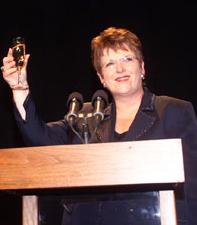
In the 1999 election, New Zealand First lost many votes. They only won 4.3% of the vote. However, Peters narrowly won his Tauranga seat, which allowed the party to stay in Parliament with five seats.
In the 2002 election, Peters campaigned on issues like reducing immigration and being tougher on crime. This helped New Zealand First gain more support, winning 10% of the vote and 13 seats.
Minister of Foreign Affairs (2005–2008)
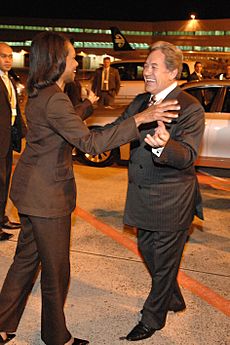
After the 2005 election, Peters became the Minister of Foreign Affairs and Minister for Racing in a Labour-led government. This was a surprise to many. He was not a full Cabinet member, which meant he could still criticize the government on issues not related to his roles.
One of Peters' key projects was the SuperGold Card. This card, launched in 2007, gives older New Zealanders benefits like free off-peak public transport and discounts.
In 2008, there were questions about donations received by Peters and his party. An investigation by the Serious Fraud Office cleared Peters of fraud. However, Parliament decided to formally criticize him for not properly declaring some financial interests. Peters said this was a "vicious character assassination."
In the 2008 election, Peters lost his Tauranga seat, and New Zealand First did not get enough votes to enter Parliament. Many thought this was the end of his political career.
Out of Parliament (2008–2017)
After the 2008 election, Peters mostly stayed out of the public eye for a while. However, he hinted at a comeback.
Return to Parliament (2011)
In the 2011 election, New Zealand First made a strong return, winning 6.8% of the party vote and eight seats. Peters returned to Parliament as a list MP. He became a spokesperson for many areas, including finance, foreign affairs, and immigration.
In the 2014 election, New Zealand First gained even more support, winning 8.6% of the vote and 11 seats.
Northland By-election (2015)
In 2015, Peters ran for and won the Northland seat in a special election. This was a big win because the seat had been held by the National Party for many years. By winning an electorate seat, New Zealand First gained an extra MP in Parliament.
2017 General Election
Before the 2017 election, Peters said that re-entering the Pike River Mine to recover victims would be a key demand in any government deal. He also proposed holding a public vote on reducing the number of MPs and on the future of the Māori electorates.
In the 2017 election, Peters lost his Northland seat. However, New Zealand First still won 7.2% of the party vote, giving them nine seats. Peters remained in Parliament as a list MP.
After the election, New Zealand First held the balance of power again. Peters had talks with both the National and Labour parties. He decided to form a coalition government with the Labour Party, led by Jacinda Ardern.
Sixth Labour Government (2017–2020)
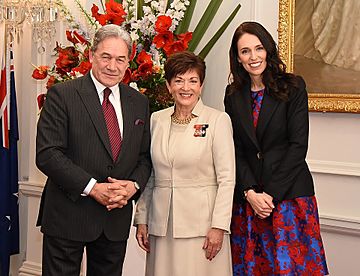
On 19 October 2017, Peters announced that New Zealand First would form a coalition with the Labour Party. He said this decision was based on changing global and local economic situations.
On 26 October 2017, Peters became Deputy Prime Minister, Minister of Foreign Affairs, Minister for State Owned Enterprises, and Minister for Racing. When Prime Minister Jacinda Ardern was on maternity leave in 2018, Peters served as Acting Prime Minister for six weeks. This was a unique situation in modern politics.
Foreign Affairs (2017–2020)
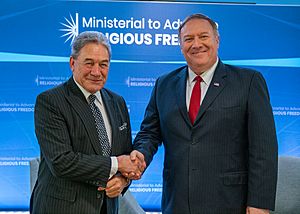
As Foreign Minister, Peters worked on strengthening New Zealand's relationships with other countries. He supported closer economic ties with the UK, Australia, Canada, and other Commonwealth nations. He also proposed a free-trade agreement with the United States.
In May 2020, Peters publicly supported Taiwan rejoining the World Health Organization. This was welcomed by Taiwan but led to a strong response from China, who reminded New Zealand of its "One China Policy." Peters stood by his comments. In July 2020, New Zealand suspended its extradition treaty with Hong Kong due to a new national security law there.
2020 General Election
In the 2020 general election on 17 October, New Zealand First's share of the vote dropped to 2.6%. This was below the 5% needed to enter Parliament, so Peters and his party lost all their seats. Peters continued in a temporary role until the new Parliament was formed in November 2020.
Out of Parliament (2020–2023)
After the 2020 election, Peters announced in June 2021 that he would continue to lead New Zealand First for the 2023 general election. He criticized the Labour, National, and Green parties, and spoke out against the increased use of the Māori language in public life.
In February 2022, Peters supported the protests outside Parliament against vaccine mandates. He visited the protest camp and urged the government to talk with the protesters. He was briefly banned from Parliament for this visit, but the ban was quickly removed.
2023 General Election
In March 2023, Peters announced that if New Zealand First was elected, they would remove Māori names from government departments. He also said the party would focus on fighting "racist separatism," dealing with banks and supermarkets, investing in health, and being tough on crime. He proposed building a "gang prison" and calling all gangs terrorist groups.
Peters also campaigned on moving the Ports of Auckland and the Navy base to Northport. He announced policies to restrict transgender people's access to bathrooms and participation in female sports. He also wanted to make English an official language of New Zealand and withdraw from the United Nations Declaration on the Rights of Indigenous People.
In September 2023, Peters made comments that Māori people were not originally from New Zealand, saying they came from the Cook Islands and China. These comments were criticized by other politicians.
On 14 October, in the 2023 general election, New Zealand First won 6.46% of the vote. This meant Peters and his party returned to Parliament with eight seats.
Sixth National Government (2023–present)
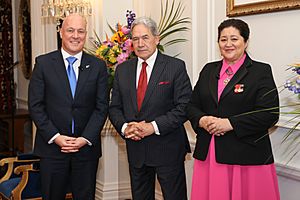
Forming the Government
After the 2023 election, the National Party needed New Zealand First to form a government. Peters, along with other New Zealand First leaders, had talks with the National and ACT parties. Peters had previously criticized some of National and ACT's policies during the election campaign.
On 23 November, the parties finished their talks. Peters, Christopher Luxon (National leader), and David Seymour (ACT leader) signed a coalition agreement. Under this agreement, Peters and Seymour would share the role of Deputy Prime Minister. Peters held the role for the first half of the parliamentary term, and Seymour took over on 31 May 2025. Peters also became the Minister of Foreign Affairs in the new government.
Foreign Affairs (2023–present)
As Foreign Minister, Peters has traveled to many countries. In December 2023, he visited Fiji to strengthen ties. In January 2024, he supported Anglo-American airstrikes against Houthi forces in Yemen to protect international shipping.
In February 2024, Peters announced that New Zealand would give NZ$25.9 million in aid to Ukraine, including money for weapons and humanitarian help. This brought New Zealand's total aid to Ukraine to over NZ$100 million.
Between March and July 2024, Peters visited India, Indonesia, Singapore, Egypt, Poland, Sweden, and the United States. He met with foreign leaders to discuss trade, security, and humanitarian issues. He also hosted Chinese Foreign Minister Wang Yi in Wellington, discussing trade and human rights concerns.
In April 2024, Peters indicated a desire for closer ties between New Zealand and the United States, including exploring joining AUKUS Pillar 2. This caused some discussion in New Zealand. He also stated that New Zealand would recognize the State of Palestine in the future, saying it was a matter of "when, not if."
In May 2024, Peters led a group of MPs on a tour of Pacific countries like the Solomon Islands, Papua New Guinea, and Vanuatu. He announced aid for the Marshall Islands to help with natural disasters. In June 2024, he announced that New Zealand would restart its funding to UNRWA, a UN agency helping Palestinians.
In July 2024, Peters attended the Pacific Islands Leaders Meeting in Tokyo. He questioned the fairness of the 2021 New Caledonia independence vote due to low voter turnout.
In October 2024, Peters disagreed with the Cook Islands Prime Minister's idea for a separate Cook Islands passport, saying it could affect their relationship with New Zealand. In February 2025, he also objected to the Cook Islands signing a partnership agreement with China without consulting New Zealand.
In March 2025, Peters removed Phil Goff from his role as High Commissioner to the United Kingdom after Goff made comments about Donald Trump. In May 2025, Peters joined other countries in calling on Israel to allow more aid into Gaza. In June 2025, New Zealand imposed travel bans on two Israeli ministers for allegedly encouraging violence in the West Bank.
Domestic Politics (2023–present)
In January 2024, Peters attended a meeting at the Rātana Church village, where he spoke and faced some heckling from the audience. He also spoke at the annual Waitangi Day gathering in February 2024, where he was heckled by protesters.
In March 2024, Peters gave a speech where he compared the previous government's co-governance policies to "race-based theory" in Nazi Germany. These comments caused controversy and were criticized by many. Peters defended his remarks, saying they were misunderstood.
In June 2024, Peters announced that the government would make it easier to build "granny flats" (small dwellings) without needing special permits. He also used a special "agree to disagree" rule in the coalition agreement regarding the COVID-19 inquiry, saying the initial inquiry was designed to protect the previous government.
In July 2024, Peters made claims about the cause of a ferry grounding incident, which were disputed by the ferry company.
On 31 May 2025, David Seymour took over from Peters as Deputy Prime Minister. Peters said his role had been to offer experience to new ministers. He also stated he would focus on New Zealand First's campaign for the 2026 general election.
Minister for Racing
On 10 December 2024, as Minister for Racing, Peters announced that the New Zealand Government would ban greyhound racing by July 2026.
Minister for Rail
On 11 December 2024, Peters was appointed as the Minister for Rail. In March 2025, he started a process to find a company to build two new, smaller ferries to replace the current Interislander vessels. These ferries are expected to be ready by 2029. He also announced that NZ$461 million would be spent on upgrading New Zealand's freight rail network and NZ$140 million on city passenger rail networks.
Views and Policies
Political Style
Peters is often described as a nationalist and a populist. This means he often focuses on New Zealand's interests and appeals directly to ordinary people. He believes in "binding citizen initiated referenda," where people can vote directly on laws. He is known for his strong speaking style and for criticizing those in power.
Economy and Welfare
Peters supports cutting taxes. He has been critical of policies that involve selling off government-owned businesses. He supports compulsory retirement savings plans for all New Zealanders. He has a lot of support from older people in New Zealand.
Immigration
Peters believes that New Zealand should have lower levels of immigration. He has said that high immigration could change New Zealand's identity and values. He has also raised concerns about the number of immigrants from Asian countries.
Disagreements with Other Politicians
Peters is known for his strong disagreements with other politicians. He has used sharp words to describe people he disagrees with. For example, he has had a long-standing rivalry with ACT New Zealand leader David Seymour. Peters has called Seymour names like "accidental Māori" and a "chihuahua." Seymour has also responded with his own comments. Despite this, they worked together to form the current government.
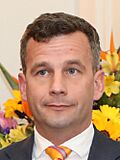
Peters also had a public disagreement with Bob Carr, a former Australian Foreign Minister, over comments about AUKUS.
Foreign Affairs Views
Peters is a strong supporter of Brexit, which was the United Kingdom leaving the European Union. He has praised the idea and is friends with some of the key figures from the Brexit campaign.
He has also criticized past New Zealand foreign policy decisions, such as a UN resolution condemning Israeli settlements.
Media Relations
Peters has a difficult relationship with the New Zealand media. He has claimed that some media outlets ignore his party or are biased. He has called some journalists names and accused media organizations of lacking independence because they received government funding. He has said he is "at war" with the press.
Honours and Awards
In 1998, Peters was appointed to the Privy Council of the United Kingdom, which gave him the title "The Right Honourable." In 2007, he received a special Samoan chiefly title called Vaovasamanaia.
Personal Life
Peters was married to Louise, and they have two children: a son named Joel and a daughter named Bree Peters, who is an actress. He is currently in a relationship with Jan Trotman.
See also
 In Spanish: Winston Peters para niños
In Spanish: Winston Peters para niños
- Populism in New Zealand
 | James Van Der Zee |
 | Alma Thomas |
 | Ellis Wilson |
 | Margaret Taylor-Burroughs |


